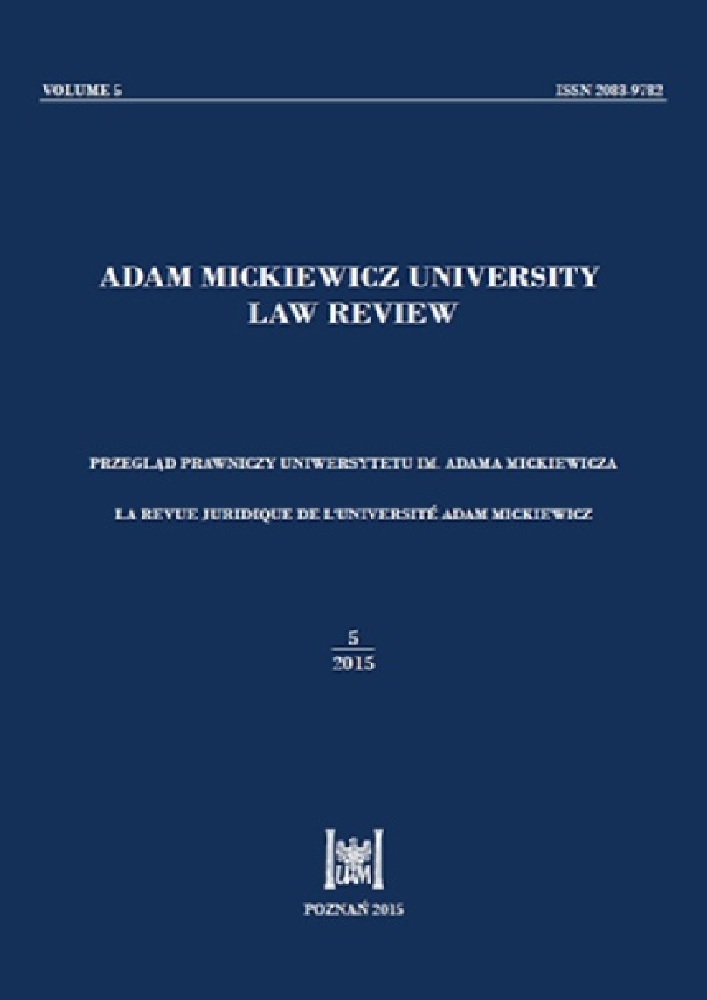Abstract
The main assumption behind this study is that the relationship between language and international law is particularly interesting due to the complexity and special nature of this relationship when compared to national law. The author focuses on some selected issues connected with the fact that from the legal point of view the multiplicity of languages in international law is an important factor affecting its interpretation. Due to this, apart from the issue of the dominant position of the English language in international law, the major focus of the study is on the specific problems associated with the interpretation of international treaties. The study suggests that there are certain intrinsic tensions and contradictions involved in the relationship between language and international law. The dominant position of English language in international law is at odds with the principle of sovereign equality laid down in the UN Charter, which entails equal opportunities for all nations to participate in the global legal discourse. Moreover, the interpretation of plurilingual treaties involves significant problems when it comes to the interpretation of authentic texts made in various languages, which need to be reconciled. In turn, the tensions between the meaning of terms used in international legal norms and their corresponding meaning in national legislation are addressed through the use of the autonomous method of interpretation. Moreover, considering the growing importance of the legitimacy of international law, the role of the language of international law in this context is also considered. The problems related to the problems of language in the context of international law outlined in this study confirm the need for further continuous and in-depth research in this field.
References
Bernhardt, Rudolf. “Thoughts on Interpretation of Human-Rights Treaties.” In Protecting Human Rights: the European Dimension. Studies in Honour of Gerard J. Wiarda, edited by Franz Matscher, and Herbert Petzold. Köln, Berlin, Bonn, and München, 1990.
Dolecka, Maria. “Pozycja języka angielskiego w świecie.” Białostockie Archiwum Językowe, no. 2. 2002: 41–54. DOI: https://doi.org/10.15290/baj.2002.02.04
Frankowska, Maria. Prawo traktatów. Warszawa, 2007.
Galán Ávila, Javier Alexis. International Law and Legitimacy: A Critical Assessment, European University Institute, Department of Law. Florence, 2016. <https://cadmus.eui.eu/bitstream/handle/1814/39005/GalanAvila_2016.pdf?sequence=1&isAllowed=y>, access: 10.09.2022.
Ganshof van der Meersch, Walter. “Le caractère “autonome” des termes et “la marge d’appreciation” des gouvernements dans l’interprétation de de la convention des Droits de l’Homme.” In Protecting Human Rights: the European Dimension. Studies in honour of Gerard J. Wiarda, edited by Franz Matscher, and Herbert Petzold. Köln, Berlin, Bonn, and München, 1990.
Gebauer, Martin. “Uniform Law, General Principles and Autonomous Interpretation.” Uniform Law Review 5, iss. 4. 2000: 683–704. DOI: https://doi.org/10.1093/ulr/5.4.683
International Law Commission. “Draft Articles on the Law of Treaties with commentaries 1966.” Yearbook of the International Law Commission 2. 1966.
Jiménez-Salcedo, Juan, and Javier Moreno-Rivero. “On Jurilinguistics: the principles and applications of research on language and law.” Revista de Llengua i Dret / Journal of Language and Law, no. 68. 2017: 1–4.
Kritsiotis, Dino. “The Power of International Law as Language.” California Western Law Review 34, no. 2. 1998: 397–410.
Kumm, Mattias. “The Legitimacy of International Law: A Constitutionalist Framework of Analysis.” The European Journal of International Law 15, no. 5. 2004: 907–931. DOI: https://doi.org/10.1093/ejil/15.5.907
Letsas, George. “The Truth in Autonomous Concepts: How to Interpret the ECHR.” European Journal of International Law 15, no. 2. 2004: 279–305. DOI: https://doi.org/10.1093/ejil/15.2.279
Matscher, Franz. “Methods of Interpretation of the Convention.” In The European System for the Protection of Human Rights, edited by Ronald St. J. Macdonald, Franz Matscher, and Herbert Petzold. Dordrecht, Boston, and London, 1993.
Merrills, John G. The Development of International Law by the European Court of Human Rights. Manchester, 1995.
Mik, Cezary. Koncepcja normatywna prawa europejskiego praw człowieka. Toruń, 1994.
Mowbray, Jacqueline. The future of international law: shaped by English. Völkerrechtsblog, 18.06.2014, <https://voelkerrechtsblog.org/the-future-of-international-law-shaped-by-english>, access: 28.04.2022.
Ost, François. “The Original Canons of Interpretation of the European Court of Human Rights.” In The European Comenius for the Protection of Human Ranges: International Protection Versus National Restrictions, edited by Mireille Delmas-Marty. Dordrecht, Boston, and London, 1992: 283–316. DOI: https://doi.org/10.1163/9789004478909_021
Phillipson, Robert. Linguistic imperialism. Oxford, 1992.
Raju, Deepak, and Zubin Dash. “Balancing The Language Of International Law And The Language Of Domestic Legitimacy – How Well Does India Fare?.” Indian Journal of International Law 57. 2017: 63–85. DOI: https://doi.org/10.1007/s40901-018-0076-9
Schenker, Claude. Practice Guide to International Treaties. Bern, 2015.
Tomuschat, Christian. “The (Hegemonic?) Role of the English Language.” Nordic Journal of International Law 86. 2017: 196–227. DOI: https://doi.org/10.1163/15718107-08602003
Uriburu, Justina. Between Elitist Conversations and Local Clusters: How Should we Address English-centrism in International Law?. Opinio Juris, 2.11.2020. <http://opiniojuris.org/2020/11/02/between-elitist-conversations-and-local-clusters-how-should-we-address-english-centrism-in-international-law/>, access: 28.04.2022.
Wyrozumska, Anna. Umowy międzynarodowe. Teoria i praktyka. Warszawa, 2006.
Ashingdane v. the United Kingdom, Application No. 8225/78, Judgement of 28 May 1985.
Bönisch v. Austria, Application No. 8658/79, Judgement of 6 May 1985.
Campbell and Fell v. the United Kingdom, Applications Nos. 7819/77 and 7878/77, Judgement of 28 June 1984.
Cruz Varas and Others v. Sweden, Application No. 15576/89, Judgement of 20 March 1991.
Demicoli v. Malta, Application No. 13057/87, Judgement of 27 August 1991.
Engel and Others v. the Netherlands, Application Nos. 5100/71, 5101/71, 5102/71, 5354/72, 5370/72, Judgement of 8 June 1976.
Frydlender v. France, Application No. 30979/96, Judgement of 26 June 2000.
Gasus Dosier-und Fördertechnik GmbH v. the Netherlands, Application No. 15375/89, Judgment of 23 January 1995.
Jamil v. France, Application No. 15917/89, Judgement of 8 June 1995.
König v. Germany, Application No. 6232/73, Judgement of 26 June 1978.
Niemetz v. Germany, Application No. 13710/88, Judgement of 16 December 1992.
Pellegrin v. France, Application No. 28541/95, Judgement of 8 December 1999.
Ringeisen v. Austria, Application No. 2614/65, Judgement of 16 July 1971.
Sheisser v. Switzerland, Application No. 7710/76/34, Judgement of 4 December 1979.
The Mavrommatis Palestine Concessions, Judgement No. 2 of 30 August 1924.
License
Copyright (c) 2022 Adam Wiśniewski

This work is licensed under a Creative Commons Attribution-NoDerivatives 4.0 International License.

